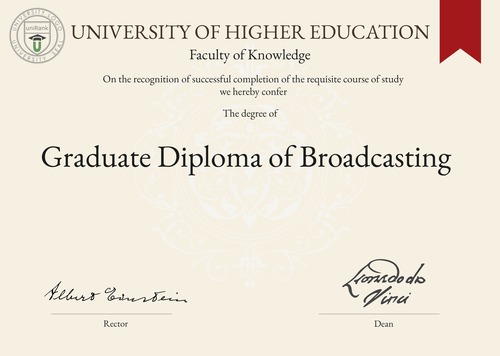
Graduate Diploma of Broadcasting (Grad. Dip. Broadcasting)
Guide to Graduate Diploma of Broadcasting Program/Course/Degree
Graduate Diploma of Broadcasting (Grad. Dip. Broadcasting)

Program Name:
Graduate Diploma of BroadcastingProgram or Degree abbreviation:
Grad. Dip. BroadcastingDuration range:
The duration of the program typically ranges from 1 to 2 years.Tuition range:
The tuition fees for the program can vary depending on the chosen country or university. It is recommended to check with specific institutions for accurate information.Overview:
The Graduate Diploma of Broadcasting program provides students with comprehensive knowledge and practical skills in the field of broadcasting. It equips them with the necessary expertise to excel in various roles within the broadcasting industry.Curriculum Overview by year:
The curriculum is designed to cover a wide range of subjects related to broadcasting. In the first year, students typically study foundational courses such as media production, journalism and communication theory. In the second year, they delve deeper into specialized areas such as radio broadcasting, television production and digital media.Key Components:
The key components of the program include hands-on training in broadcasting technologies, media production, scriptwriting, news reporting, editing and broadcasting ethics. Students also gain practical experience through internships and industry placements.Career Prospects:
Graduates of the program can pursue various career paths in the broadcasting industry. They may find employment as radio or television presenters, producers, journalists, news reporters, video editors, or media consultants. Opportunities exist in both traditional broadcasting outlets and emerging digital media platforms.Salary Expectations:
Salary expectations for graduates of the Graduate Diploma of Broadcasting program can vary depending on factors such as experience, location and the specific role. Entry-level positions may have lower salaries, while experienced professionals in managerial or senior positions can earn higher incomes. For a more accurate understanding of salary expectations, you can utilize the Job Sites Search Engine, from our sister site jobRank, which searches over 4,600 job sites worldwide. Make sure to specify not only the job title but also the country you are interested in.Conclusions:
It is important to note that the duration, tuition fees, curriculum, key components, career prospects and salary expectations of the Graduate Diploma of Broadcasting program can vary. These variations can be influenced by the chosen country or location where the program is studied, as well as the specific university offering the program. Visitors interested in pursuing this degree are encouraged to use the uniRank World Universities Search Engine to find institutions offering the Graduate Diploma of Broadcasting program worldwide.World Universities Search Engine
search for Graduate Diploma of Broadcasting (Grad. Dip. Broadcasting) and add the Location (country, state etc.) or specific University you are interested in studying at.
Query examples:
- Graduate Diploma of Broadcasting (Grad. Dip. Broadcasting) United States
- Graduate Diploma of Broadcasting (Grad. Dip. Broadcasting) United Kingdom online
- Graduate Diploma of Broadcasting (Grad. Dip. Broadcasting) Australia international students
- Graduate Diploma of Broadcasting (Grad. Dip. Broadcasting) University of California
- Graduate Diploma of Broadcasting (Grad. Dip. Broadcasting) University of London tuition fees
- Graduate Diploma of Broadcasting (Grad. Dip. Broadcasting) University of Sydney scholarships
Share Program/Course
Interesting? Share this program/course/degree info with your friends now.